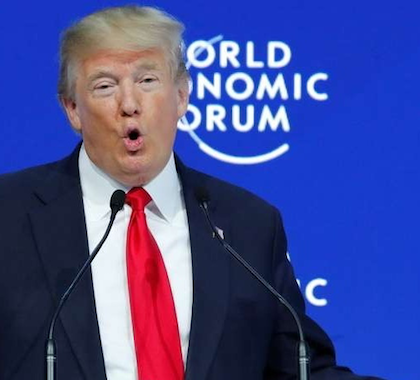The announcement below was made by Reuters on October 16 about the U. S. economy leading the world in global competitiveness. Surely this is worth a “hot diggity damn.”
This improvement in global competitiveness is due to President Trump’s reversal of failed economic policies of former President Obama who wanted to stop using our abundant, reliable, and inexpensive coal, oil, and natural gas and replace them with expensive, unreliable, and vast land area requiring solar, wind, ethanol from corn, other biofuels, etc.
After his January 20, 2017 inauguration, President Trump ordered energy supply based upon sound economics and dismantling regulations prohibiting fossil fuel use. On January 30, 2017, President Trump issued Executive Order 13771 “Reducing Regulations and Controlling Regulatory Costs” which ordered government agencies to rescind two government regulations for every proposed new one.
In addition, President Trump introduced economy stimulating legislation like the 2017 Tax Cuts and Jobs Act. These actions led to the U. S. becoming the world’s most competitive economy.
Here’s the Reuters story:
WASHINGTON (Reuters) – The U.S. economy sits atop of the World Economic Forum’s (WEF) annual global competitiveness survey for the first time since the 2007-2009 financial crisis, benefiting from a new ranking methodology this year, the Swiss body said on Tuesday.
In its closely-watched annual Global Competitiveness Report, the WEF said the U.S. is the country closest to the “frontier of competitiveness,” an indicator that ranks competitive productivity using a scale from zero to 100.
The U.S. beat Singapore, Germany, Switzerland and Japan, the other top four markets, with a score of 85.6 out of 100, the report said, due to its “vibrant” entrepreneurial culture and “strong” labor market and financial system.
The World Economic Forum, the same organization that runs the Davos meeting of global powerbrokers each January, bases its rankings of 140 economies on a dozen drivers of competitiveness, including a country’s institutions and the policies that help drive productivity.
This year the WEF changed its methodology to better account for future readiness for competition, such as a country’s idea generation, entrepreneurial culture, and the number of businesses that disrupt existing markets.
The last time the U.S. topped the list was 2008.
The WEF said it was too early to factor in how the Trump administration’s recent trade policies would affect its ranking.
“While it is too early for the data to filter through in this year’s report, we would expect trade tensions with China and other trading partners to have a negative impact on the US’ competitiveness in the future, were they to continue,” Saadia Zahidi , the managing director at the World Economic Forum, said in an email.
“Open economies are more competitive.”





